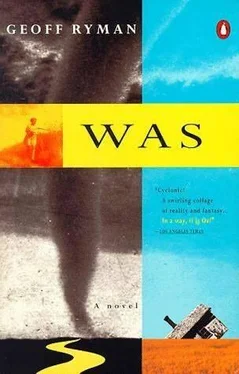Dorothy would have to divide and find different places to keep things within herself. Memories here, love here, hate there, dreams here, school there. And hope?
She talked to Toto as she swept the floor, as she told Aunty Em she loved her, as she greased Uncle Henry's boots.
"Toto, you bad, bad dog," she would tell him, in imitation of Aunty Em. She would whup him, and he would cower in the corner, shaking. She would beat him mercilessly with the broom, kick him in the ribs and out of the door.
"Sit up and beg," she would tell him, and he did, feet pumping helplessly in midair, waiting for an answer that never came.
On the wall, there was an old sampler, slightly charred in one corner. It was signed in needlework: Millie Branscomb, aged 8, 1856.
"There is no place like home," it said.
And there wasn't, not anywhere.
Culver City, California-February 1939
We have also seen, that, among democratic nations, the sources of poetry are grand, but not abundant. They are soon exhausted: and poets, not finding the elements of the ideal in what is real and true, abandon them entirely and create monsters. I do not fear that the poetry of democratic nations will prove insipid, or that it will fly too near the ground; I rather apprehend that it will be forever losing itself in the clouds, and that it will range at last to purely imaginary regions. I fear that the productions of democratic poets may often be surcharged with immense and incoherent imagery, with exaggerated descriptions and strange creations; and that the fantastic beings of their brain may sometimes make us regret reality. -Alexis de Tocqueville, Democracy in America
If I only had a heart, lamented the Tin Man, close on half a century ago. In our contemporary fantasies, the androids are made of sterner stuff… -Sheila Johnston, in a review of the movie Robocop , from The Independent , February 4, 1988
It was five-thirty when Millie got to work. Five-thirty in the morning, that is. Took the bus. Knew most everybody on it. They all worked for the studio too. She said Hello to them; they murmured back. She got a couple of minutes' shut-eye, forehead on hand. She could feel the cough and throb of the bus through her elbow as it rested on the edge of the window.
A few minutes before they arrived, Millie put a fresh piece of Wrigley's Spearmint in her mouth, gathered up her bag and thermos flasks, and got up. She stood by the middle door, early, to avoid the exodus. Practically the whole dang bus got off at MGM.
The morning smelled of unburned gas and it was dark. There were pools of light around the studio, Millie said hi to Joe at the gate. She always brought him a thermos of coffee.
"Hi, Joe. Boys here yet?" she asked him.
"Yup. They'll be in the chair. Most of the kids are here too." He thanked Millie for his coffee and passed her yesterday's empty thermos.
"Welp. Off to work," said Millie. "Say hello to Joyce for me."
Millie had been over to their place. Lived in Santa Monica, right near her. Nice, ordinary people. Most of the people working at Culver were nice, except for the bigwigs and some of the actors. Even most of them were okay. So how many folks are wonderful at five-thirty in the morning?
Sometimes actors were. There were some of them who were just never offstage. They'd talk to you and keep you entertained while you worked. It was one of the many good things about this job.
Millie's shoes clicked on the concrete as she walked to the trailers. Cold this hour of the morning. Her gum clicked too. Millie liked the sound of punctuation and of process. She liked things to move, for herself and other people. Why she was so good at her job. Lots of people around who could do makeup. But there was more to the job than that.
Millie managed the team when Jack Dawn wasn't around. She would check out her boys and girls, get them all lined up, schedules ready. They were good kids, hardworking. This danged picture is made of makeup, Millie thought, hours of it every morning. Latex and fur and all of that stuff.
But nothing ever again, Millie thought, could be as bad as those darned Munchkins. One hundred and twenty-four of them all lined up in Rehearsal Hall 8, moving from chair to chair like it was an assembly line. Hard work, but the Little People were fine to work with. Millie had no time for the stories. Millie told her crew to treat them as adults, call them Mr., Miss, or Mrs. and to watch out for knives. Only one or two of them had knives, the real deadbeats, the drunks. Most of them were sweet and looked kinda lost. Like they woke up in the wrong world. But all this sexual business that people were saying. That was just their own dirty minds. The Little People were sweet as could be and as innocent as lambs. Heck, a lot of them had to be. There was something wrong with their glands. A lot of them had foreign accents and got totally lost in the studio. Had to be led around like a class of schoolchildren.
Humiliating for them really. Dressed up in those horrible clothes that pansy had designed for them. Get you, sweetie. Put them in big collars, loose sleeves, to make them look even smaller. Costumes were so bad, they had to have people help them out of them when they had to pee. People were just so mean. One minder used to carry them to the John, one under each arm. "What am I, a nursemaid?" Insulting. They didn't like it either, Big Man. That poor little fellow who fell into the John and couldn't get out? We put big ugly red spots on their cheeks. Supposed to look like they were made of porcelain. Big deal. I just told the kids to treat them with respect.
Lights on inside and warmer.
"Hi, Millie."
"Hiya, Tony."
"Storm last night."
"Yeah, big wind. Any damage to your place?" Millie asked.
"No. But we got a lot of sweeping up to do. Lots of eucalyptus, and you know how they shed bark."
"Not a problem we ever had in Missouri. Got all your gear?" Tony had been new, brought in to help handle the Munchkins. Jack had him stay on to train. "Got your pencils, spirit gum?" Millie asked. Her fingers rattled through the box.
"Mmmm hmmm," said Tony, sharpening an eyebrow pencil.
"You mix this today?" The spirit gum.
"Uh, no, that's yesterday's."
"Well it looks like it. That stuff's murder at the best of times. You better mix it new."
"Okey-dokey."
Nice ordinary people.
Millie looked at the schedule. "How come you're doing Frank?"
"Jack had Harry and me switch."
"Oh, sorry, he did tell me. Slipped my mind this hour of the morning." Millie thought of Frank Morgan. "Don't light a match," she warned the kid.
Tony smiled. "I know."
Frank Morgan liked his tipple.
"See you later."
"See you."
Just a quick hiya to the old hands. They knew enough to mix their gum fresh. Hi Tommy, Hi Mort, Hi Bill. Bad storm last night. Drains on our street's all blocked. This city is not designed for rain.
Millie got to her own locker and hauled out her kit. Looked like a toolbox. My little pirate's chest of goodies, thought Millie. All kinds of colors, hard to get. If I lose this, I might as well close up shop for good. Now let's see. Bit of mascara, eyebrows. Today is black-and-white, isn't it, so the lips are going to have to be even lighter than usual or she'll end up looking like Theda Bara. There now. Take all this over, have it ready, and pull back the Technicolor stuff so I don't make a mistake.
Millie loaded it all into a bag and walked down the hall away from the dressing rooms. She walked down the corridor, stepped outside. Everything was a beautiful blue color now, cool, with quite a wind blowing. It whipped the back of her coat up. She walked onto Stage 27. Monkeys were all over the rafters, fixing lights. Paint was still drying on the Kansas backdrop outside the window. Twelve-foot-wide moat between the wall and the set, filled with a bank of lights. Thank God those lights were off for once. Millie was cold, but not that cold. She went to the stars' dressing room, a trailer they had wheeled on to the stage, and opened it up. Millie had a key. She opened it up and laid the makeup out on the table.
Читать дальше












